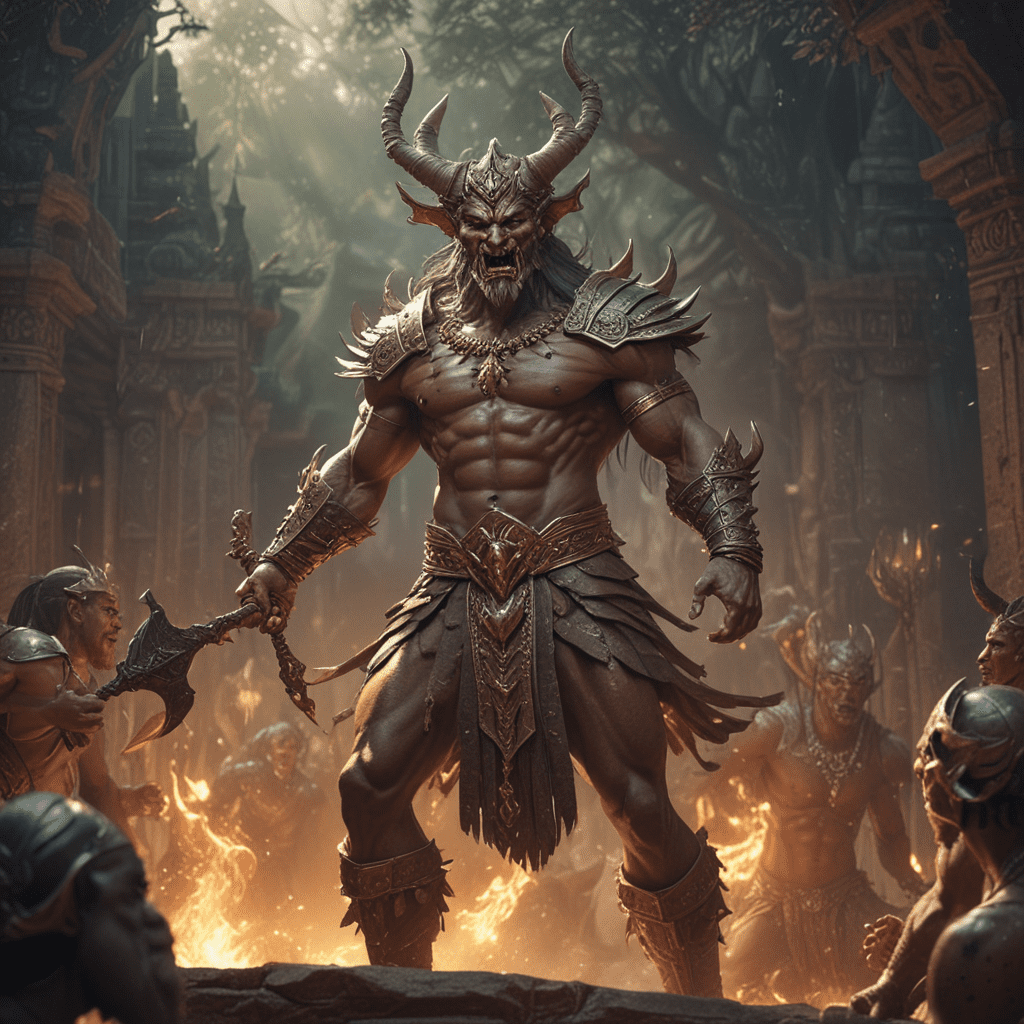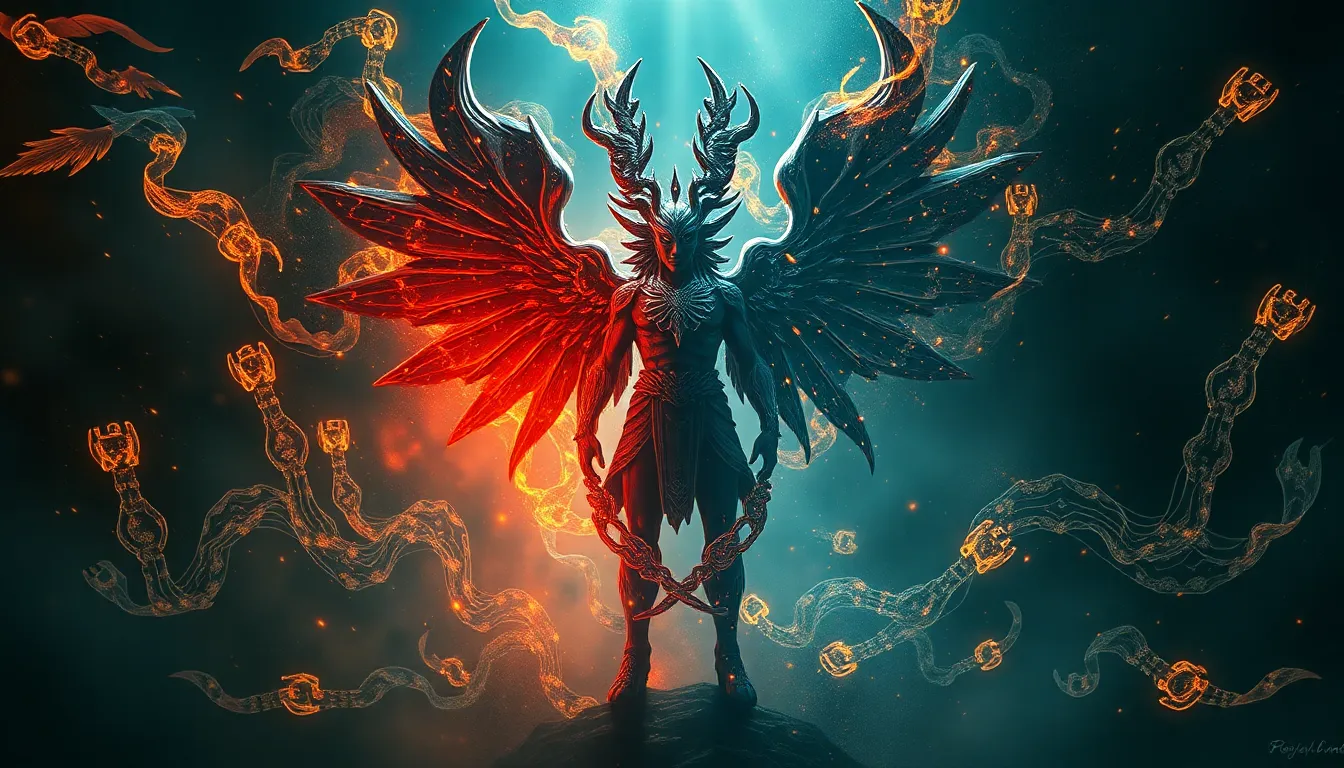The Story of Ahiravan: The Demon King of Patala
I. Introduction to Ahiravan and Patala
Ahiravan, a malevolent demon king, ruled over the subterranean realm of Patala, deep beneath the surface of the earth. In Hindu mythology, Patala is described as a shadowy underworld, consisting of seven layers, each inhabited by different types of demons and otherworldly beings. Ahiravan was known for his formidable powers, cunning intelligence, and unwavering devotion to his patron deity, Lord Shiva. His story is intricately woven into the epic Ramayana, where he emerges as a formidable adversary to Lord Rama, the incarnation of Lord Vishnu.
II. Ahiravan's Origins and Powers
The origins of Ahiravan are shrouded in mystery and legend. Some accounts suggest that he was the son of the demon Hiranyakashipu, who was slain by Lord Vishnu in his avatar as Narasimha. Others attribute his birth to the curse of sage Durvasa, who granted him immense power and dominion over Patala. Ahiravan possessed a vast array of supernatural abilities, including the power to change his form at will, create illusions, and manipulate darkness. He commanded a formidable army of demons, each with unique skills and weapons.
III. Ahiravan's Conflict with Lord Rama
Ahiravan's conflict with Lord Rama began when Ravana, the demon king of Lanka and Ahiravan's cousin, abducted Sita, Lord Rama's consort. Driven by the desire to rescue his beloved wife, Lord Rama and his army laid siege to Lanka. However, Ahiravan intervened, transporting Ravana and Sita to the depths of Patala, where he believed they would be safe from Rama's reach.
IV. The Battle in Patala
The battle that ensued in Patala was one of the most epic and intense conflicts in Hindu mythology. Lord Rama and his allies, including Hanuman, the monkey god, fought valiantly against Ahiravan and his demonic hordes. The battle raged across the seven layers of Patala, each with its own unique challenges and horrors. Ahiravan used his cunning and powers to deceive and outwit his opponents, making the battle all the more perilous.
V. Ahiravan's Deception and Infiltration
As the battle reached its climax, Ahiravan resorted to deception to gain an advantage. He disguised himself as Lord Rama and infiltrated the enemy camp, attempting to assassinate the prince. However, Hanuman, known for his intelligence and unwavering loyalty, unmasked Ahiravan's true identity, exposing his treachery and forcing him to retreat.
VI. Hanuman's Role in Unmasking Ahiravan
Hanuman's intelligence and quick thinking played a pivotal role in unmasking Ahiravan's deception. Ahiravan had used his powers to assume the form of Lord Rama, attempting to create confusion and sow discord among the opposing forces. However, Hanuman possessed the unique ability to recognize the true nature of beings, regardless of their disguises.
Through his keen observation and astute intuition, Hanuman discerned Ahiravan's true identity. He confronted the demon king, exposing his treachery before the assembled army. This revelation shattered Ahiravan's plans and forced him to confront Lord Rama in open combat.
VII. The Final Confrontation and Ahiravan's Demise
The final confrontation between Lord Rama and Ahiravan was a fierce and decisive battle. Ahiravan summoned all his powers and unleashed his most formidable illusions and magical attacks. However, Lord Rama, guided by his divine wisdom and unwavering determination, countered Ahiravan's every move.
As the battle raged, Lord Rama unleashed his celestial weapons, including the Brahmastra, the most powerful weapon in the universe. The Brahmastra pierced through Ahiravan's defenses, striking him with an irresistible force. The demon king was vanquished, his reign of terror over Patala brought to an end.
VIII. The Consequences of Ahiravan's Defeat
Ahiravan's defeat had far-reaching consequences for the realm of Patala and beyond. His rule had been characterized by tyranny, oppression, and darkness. With his demise, the inhabitants of Patala were liberated from his oppressive grip.
Furthermore, Ahiravan's defeat dealt a significant blow to the forces of evil. His power and deception had been a source of strength for other demonic beings. His fall weakened their collective influence, making it more difficult for them to challenge the forces of righteousness.
IX. Ahiravan's Legacy in Hindu Mythology
Ahiravan remains an enduring figure in Hindu mythology, representing the destructive potential of unrestrained ambition and deception. His story serves as a cautionary tale about the consequences of evil and the importance of upholding righteousness.
Despite his defeat, Ahiravan's cunning and formidable powers continue to captivate the imagination of storytellers and scholars alike. His legacy as a formidable adversary to Lord Rama ensures that his name will forever be etched in the annals of Hindu myth.
X. Conclusion: The End of the Demon King of Patala
The story of Ahiravan, the Demon King of Patala, is a gripping tale of conflict, deception, and the ultimate triumph of good over evil. Ahiravan's cunning and formidable powers posed a significant threat to Lord Rama and his allies. However, their unwavering determination and the intervention of Hanuman ultimately led to his downfall.
Ahiravan's demise liberated the realm of Patala from his oppressive rule and weakened the forces of evil. His legacy as a fearsome adversary to Lord Rama continues to serve as a reminder of the importance of vigilance, righteousness, and the unwavering power of determination.
FAQ
Q: Who was Ahiravan and what was his significance?
A: Ahiravan was the formidable demon king of Patala, known for his cunning, deception, and immense power. His conflict with Lord Rama forms a significant part of the epic Ramayana.
Q: What was the significance of the battle in Patala?
A: The battle in Patala was a pivotal confrontation between Lord Rama and his allies against Ahiravan and his demonic forces. The outcome of this battle had far-reaching consequences, weakening the influence of evil and liberating the realm of Patala from oppression.
Q: How did Hanuman play a crucial role in Ahiravan's defeat?
A: Hanuman's keen observation and ability to recognize true nature allowed him to unmask Ahiravan's deception. His intervention exposed Ahiravan's treachery and set the stage for his final confrontation with Lord Rama.
Q: What was the significance of Lord Rama's victory over Ahiravan?
A: Lord Rama's victory over Ahiravan represented the triumph of good over evil. It weakened the forces of darkness, liberated Patala from oppression, and served as a reminder of the importance of righteousness and determination.
Q: What is Ahiravan's legacy in Hindu mythology?
A: Ahiravan remains an enduring figure in Hindu mythology, embodying the destructive potential of unrestrained ambition and deception. His story serves as a cautionary tale about the consequences of evil and the enduring power of righteousness.



